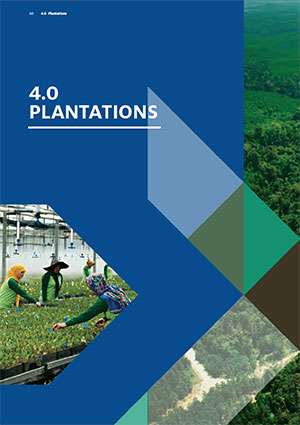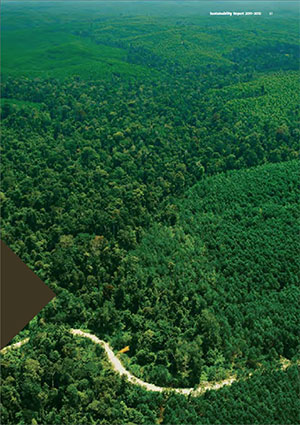APRIL’s plantation management strategy is to operate high yield production forests in line with world best practice, while protecting conservation areas.
We are guided by the definition of Sustainable Forest Management (SFM) laid down by the Food and Agriculture Organisation of the United Nations (FAO): “Achieving a balance between society’s increasing demands for forest products and benefits, and the preservation of critical biodiversity – essential for the survival of forests, and the prosperity of forest dependent communities”.
APRIL derives clear business benefits from an SFM approach, which represents a form of risk management. Factors such as disaffected local communities, corruption, damaging farming practices, fire and haze, and unstable economics can potentially disrupt our operations. By applying SFM principles, we can minimize the business risk related to these factors. We believe our success in obtaining both plantation concession licenses and a major eco-restoration license reflects our SFM approach.

Our forestry practices are contained in the company’s Code of Best Practice and in Standard Operating Procedures. All APRIL employees and contractors are trained in these practices.
Key best practices include:
Tree Planting
Ensuring plantation areas are rapidly replanted is important for sustainable wood supply and to maintain vegetation cover.
We operate a network of three central nurseries and six satellite nurseries that have the capacity to produce over 150 million plants per year. From these, we supply high-yield seedlings for our own plantations and those of supply partners and community partners. In each of 2011 and 2012, APRIL enabled the planting of more than 130 million trees.
Efficiency and Yield
Maximising yields is a key aspect of effective plantation management as higher productivity minimizes the amount of land needed to deliver the necessary fibre supply to the mill. Since commencement of plantation establishment in 1994, APRIL has worked to increase the fibre yield of its plantations through improvements in areas such as planting and harvesting.
Continually improving yield and efficiency requires ongoing R&D and rigorous implementation of standardised processes.
Silviculture and Yield Improvement
APRIL’s approach to plantation management is to capitalise on the natural advantages of our location in Riau Province - fertile soils, high rainfall and a tropical climate, while caring for the land we operate on.
Focus areas include best practice silviculture, achieving genetic improvements through research and development, optimal matching of sites with species and effective water management. We do not use GMO in our silviculture practices.
Nursery Operations
Plantation development is supported by three central nurseries producing a total of approximately 10 million plants per month. These are supplemented by a network of satellite nurseries that play an important role in creating employment opportunities for local communities. Our total nursery capacity means we can grow over 150 million plants per year. Plants are produced from cuttings and seeds. Seeds are supplied by the Research & Development Department.

Use of Fertilisers
In APRIL’s plantations, plant debris, including branches and bark, is left in the field to maximise retention of nutrients, reduce erosion, and reduce the need for artificial fertiliser.
The cultivation of plantations requires the addition of fertilisers in order to maintain and enhance yields. Application of fertiliser is done in a manner that minimises its impact on off-site locations through prevention of groundwater and surface water eutrophication.
Fertiliser availability is controlled via central stores. Procedures such as the dosage and type of fertiliser to be applied are formulated by the Research and Development department.
Soil mapping and site classification has been completed for all plantations. This assists in delineating planting areas and applying site-specific fertiliser regimes.
Pest Management
Managing pests is a necessary part of maintaining plantation productivity.
The key threats to acacia trees are root rot Ganoderma, Ceratosystis and insect pests (in particular Helopeltis). APRIL uses an Integrated Pest Management (IPM) approach, including biological control.
We also manage pests and diseases through regular monitoring and reporting of tree health, while pest and disease resistance are key selection criterion in the production of high-quality planting stock.
Pest-control chemicals are managed by central stores. Training in agrochemical use is provided for employees, and MSDS sheets are available. Regular medical checks are undertaken for people dealing with agrochemicals. High levels of weed control are achieved with minimal use of chemicals, using prescribed herbicides.
Mechanisation of Harvesting
From 2011, APRIL has taken actions to increase the level of mechanized harvesting within our forestry operations. Mechanized harvesting improves efficiency and worker safety. It also reduces harvesting time and wastage, which allows for improvements in replanting.

